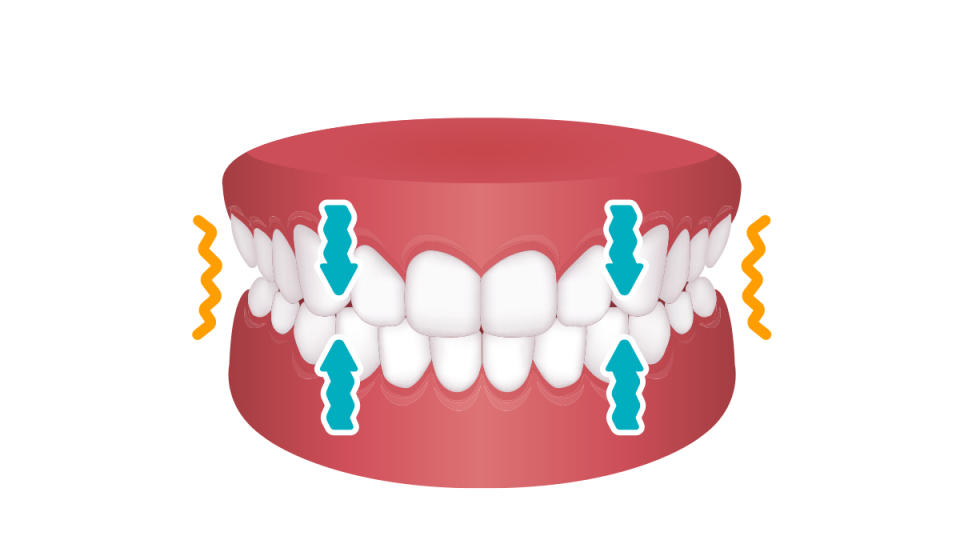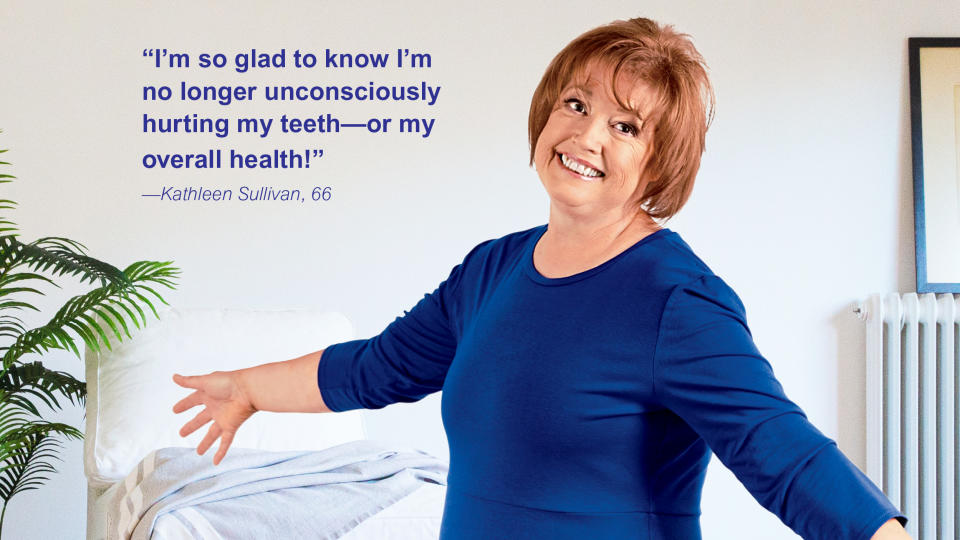More Than 80% of People Who Grind Their Teeth in Their Sleep Don't Know They Do It — This Simple Tweak Puts an End to It
A clenching and grinding condition called sleep bruxism is more than just a pain in the jaw: It also triggers tiredness, headaches and other draining symptoms. Fortunately, simple strategies can ease teeth grinding to ease pain and restore energy, from mouthguards and simple exercises to the best sleep position for bruxism. Keep reading for details on the simple tweaks that can help you sleep soundly, then learn how Kathleen Sullivan, 66, went from tired to terrific when she figured out how to outsmart sleep bruxism.
What is sleep bruxism?

The term bruxism refers to repeated activity of the jaw muscles that’s characterized by clenching or grinding of the teeth. And as the name implies, sleep bruxism is a form of the condition that occurs during sleep. Researchers reporting in the journal American Family Physician note that bruxism occurs in up to 96% of adults, triggering symptoms that include jaw pain, fatigue, headaches, tooth wear and tooth sensitivity. But findings in the Journal of Conservative Dentistry suggest more than 80% of sleep bruxers are unaware of their habit.
Related: Dentists: This Jaw Massage May Ward Off Tension Headaches and Migraines
How sleep bruxism triggers tiredness
Grinding keeps muscles around the jaw tense, says Tim Chase, DMD., a cosmetic dentist in New York City. And the biting force during sleep can prove exhausting since it’s up to 112% greater than with daytime grinding. “Imagine how tired you’d feel if you were doing bicep curls all night as you slept,” Dr. Chase notes.
Plus, bruxing prevents the muscle relaxation needed for restorative sleep. In fact, findings in the journal Head & Face Medicine reveal sleep bruxism raises the odds of difficulty falling asleep by 90% while increasing risks of nighttime awakenings by 70%.
What causes bruxism during sleep?
Sleep bruxism often runs in families. In fact, a study in the journal Sleep determined that folks who had an immediate family member with nighttime bruxism were 363% more likely to suffer from sleep bruxism themselves. But other factors can also increase sleep bruxism risk. Among them:
1. Soaring stress
Stress activates the sympathetic nervous system to trigger muscle tension and increase bruxism risk, according to a report in the journal Biomedical Research International. The study authors deemed chronic stress the most significant contributor to sleep bruxism. And in a Brazilian Journal of Epidemiology study, people who reported high levels of stress were 76% more likely to suffer from sleep bruxism compared to their less-stressed counterparts.
2. Nutritional deficits
Shortfalls in vitamin D increase sleep bruxism risk by 566%, while low intakes of the mineral calcium increase the change of developing the condition by 494%. So say researchers reporting in BMC Oral Health, who explain the nutrients play key roles in regulation muscle and nervous system function.
Related: If You Can’t Lose Weight and Feel Blah, You Likely Need More Vitamin D, Say Doctors
3. Abnormal nighttime breathing
The start-and-stop breathing patterns that occur due to snoring and sleep apnea can set nighttime clenching and grinding in motion. In a Journal of Clinical Medicine study, disordered breathing patterns during sleep increased the likelihood of sleep bruxism by 101%. The researchers theorize that jaw muscles tense as a protective response that helps open up airways.
How to tell if you have sleep bruxism
Doctors can diagnose bruxism based on physical exams and telltale symptoms. But for a simple self-check, holistic dentist Kelly Blodgett, DMD, suggests the following: “Shine a flashlight in your mouth. If you see flat surfaces across many or all of your teeth, you probably have bruxism.” Other signs you’re suffering from sleep bruxism:
Fatigue
Brain fog
Chipped, cracked or loose teeth
Tooth sensitivity
Jaw pain or tightness
Headaches
Facial pain
Sleep disruptions
4 easy ways to treat sleep bruxism
Healthcare providers sometimes advise prescription medications to cut down on nighttime clenching and grinding. But the following strategies can ease sleep bruxism, no medication required:
1. Wear a mouthguard when you sleep
A nighttime mouthguard reduces grinding by 50% the very first night, according to an investigation in the Journal of Dental Research. One that's been custom-fit by a dentist is best, but in the meantime, Dr. Blodgett advises a durable over-the-counter option (like Pro Teeth Guard Hard Night Guard, buy at ProTeethGuard.com for $209.99). The devices are typically HSA/FSA eligible.
(Dr. Blodgett advises against soft mouthguards, as people with bruxism can bite through them and swallow the plastic.)
2. Say ‘ahhh’
“Mouth yoga” soothes stress and relaxes jaw muscles. That’s why Dr. Blodgett recommends this daily two-minute to-do: Open your mouth wide and rub the sides of your jaw from just below the temples to the chin; follow with a moist heat compress. For more facial exercises to outsmart teeth clenching, check out this video from CityPhysio:
3. Skip afternoon caffeine
“Caffeine is a stimulant, so it can magnify stress — and the tendency to grit or grind,” explains Clifford Williams, DMD, a cosmetic and restorative dentist in New York City. Indeed, caffeine drinkers are 40% more likely to have sleep bruxism than caffeine avoiders, according to research from Stanford University. Dr. Williams suggests cutting caffeinated-beverage intake to a cup or two in the A.M. and then switching to decaf after noon to ensure a gnash-free night. Bonus: Excess caffeine can speed loss of calcium from the body, according to findings in the British Journal of Pharmacology. So cutting back could help prevent shortfalls in the mineral that have been linked to increased bruxism risk.
4. Switch to the best sleep position for bruxism
Sleeping on your back allows your tongue and soft palate to block airways, increasing the snoring that can trigger sleep bruxism. Fortunately, findings in the journal Sleep reveal sleeping on your side rather than your back reduces snoring by up to 65%. That also makes it the best sleep position for bruxism. In fact, a study in the journal Chest suggests side-sleeping slashes nighttime teeth clenching by 44%.
Sleep bruxism success story: Kathleen Sullivan, 66

"Coffee…I just need coffee,” Kathleen muttered to herself after turning off her alarm. “I’d been in bed all night yet I still felt horribly exhausted, and my jaw ached," she recalls. "As I staggered down the hall to the kitchen, I kept crashing into the wall, feeling like I was one step away from collapsing into a coma. How can I feel this bad every single day?"
Kathleen was too tired to function
“Back then, I operated in ‘survival mode,’ always out of breath, in pain and so tired — yet I didn’t sleep well. In the middle of the night, I’d just tune the radio to Coast to Coast-AM and listen until I fell back asleep.
“I felt drained all day, but threw myself into my work at a school, where responsibilities kept piling on my shoulders: teaching classes, coaching cheerleading, leading Sunday school. I forced myself to pace around the classroom so I wouldn’t nod off.
“With my limited energy, the students always came first, so other things in life fell to the wayside. My apartment became cluttered and I lost touch with friends. I was simply too tired to do anything extra on the weekends.
“Like most strong women I knew, I pushed through without making a fuss. I just got used to my problems. It’s like the fable of the frog slowly being boiled alive: I didn’t truly notice how bad things were getting because the changes were so gradual.
“Deep down, however, I hated the way I was aging. It was like I could see my body weakening. Even my teeth—I’d bite into a slice of pizza and my old, tired teeth were like dull knives, barely able to do their job.
The moment that caused Kathleen to take action
“I had a big wake-up call one Sunday when I blacked out from exhaustion while driving down the freeway. Thankfully, I came to in time to prevent an accident. But it was scary. After that, I actually held one eyelid open while driving, blared the radio and opened the windows to keep myself from dozing. People suggested chewing gum but the soreness in my jaw would be too much.
“Each night as I tucked myself into bed, I hoped I’d somehow wake up feeling refreshed. It never happened. Instead, I feared I’d die from exhaustion somewhere in an assisted-living facility by the age of 65.
A surprising diagnosis
“Then one day I visited a new dentist. I’d seen many doctors over the years as I changed jobs and moved, but this visit stood out. The dentist saw a pattern of wear on my teeth from grinding-: My incisors were flat, one of my canines was chipped and my bottom molars were badly worn. The pressure had caused hairline fractures.
“I was shocked! I didn’t know I was grinding — I just thought I was a restless sleeper. I was diagnosed with nighttime bruxism and was asked, ‘So what’s stressing you out?’ The question caught me off guard. I always had a smile on my face, my mind didn’t race and I meditated every morning. But I realized I was a workaholic. The dentist said that hidden stress can manifest itself at night when we’re unaware. Until that point, I never realized the toll the stress was taking on my body.
“I started wearing a prescription mouthguard — and my grinding created huge craters in it. No wonder I wasn’t sleeping well! The mouthguard helped a little, but didn’t address my stress. So I went on a wellness search that led me to nutritionist Ann Louise Gittleman. Through her books, I detoxed my body- — including my liver and stressed adrenal glands — trading old processed foods like pizza for whole foods and supplements like magnesium.
Today, Kathleen feels fantastic!
“With those soothing changes, my insomnia ended. Holy Moses, I started to feel like I used to feel when I was younger! When I noticed my newest mouthguard didn’t develop telltale divots, I knew I was cured. Now I don’t even need a guard. I’m so glad to know I’m no longer unconsciously hurting my teeth—or my overall health.
“Bruxism was a real pain, but it was the thing that made me take a deeper look at my overall health and stress levels. Now I feel like I’m aging in reverse. My energy levels are going back to what they were 20 years ago. I even went downhill skiing last winter, something I haven’t been able to do in years. I’m so grateful to have control over my life again. Heavenly days!”
This content is not a substitute for professional medical advice or diagnosis. Always consult your physician before pursuing any treatment plan.
For more on sneaky sleep stealers, keep reading!
“A Drugstore Cure Calmed My Restless Legs Immediately — I Can Finally Sleep!”
CBD Oil For Sleep: Top MDs Explain How It Works and When To Take It For Best Results
This ‘Music’ Switches Your Brain Into Deep Sleep Mode Automatically, Say Sleep Docs
